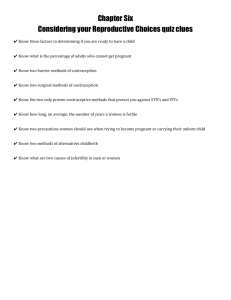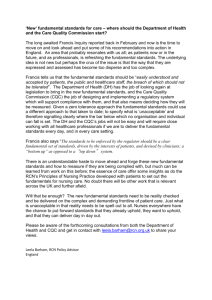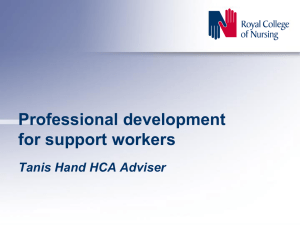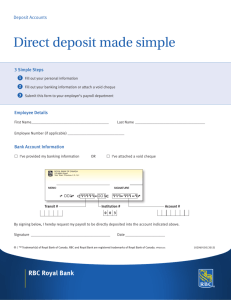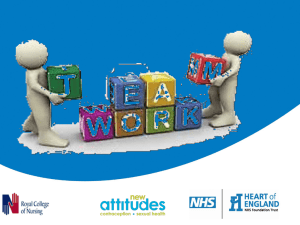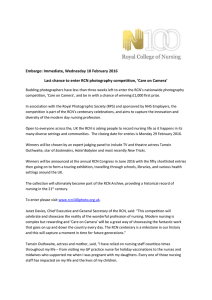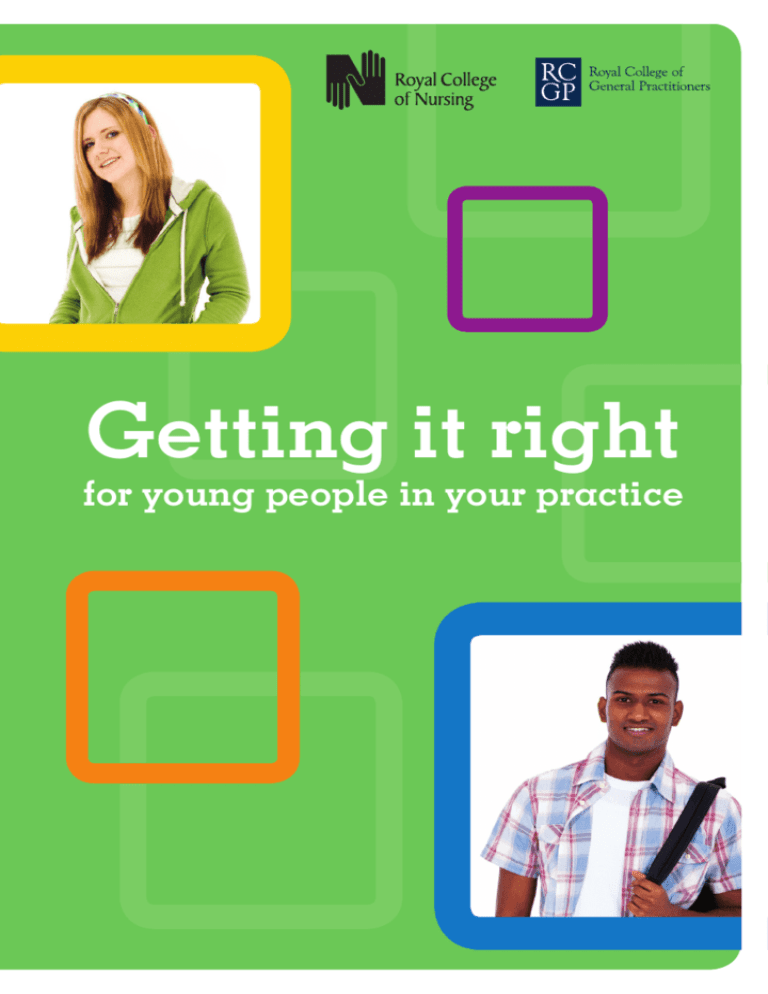
Getting it right
for young people in your practice
RCN Legal Disclaimer
This publication contains information, advice and guidance to help members of the RCN. It is intended for use within the UK but
readers are advised that practices may vary in each country and outside the UK.
The information in this publication has been compiled from professional sources, but its accuracy is not guaranteed. Whilst
every effort has been made to ensure the RCN provides accurate and expert information and guidance, it is impossible to
predict all the circumstances in which it may be used. Accordingly, to the extent permitted by law, the RCN shall not be liable to
any person or entity with respect to any loss or damage caused or alleged to be caused directly or indirectly by what is
contained in or left out of this information and guidance.
Published by the Royal College of Nursing, 20 Cavendish Square, London, W1G 0RN
© 2014 Royal College of Nursing. All rights reserved. Other than as permitted by law no part of this publication may be
reproduced, stored in a retrieval system, or transmitted in any form or by any means electronic, mechanical, photocopying,
recording or otherwise, without prior permission of the Publishers or a licence permitting restricted copying issued by the
Copyright Licensing Agency, Saffron House, 6-10 Kirby Street, London EC1N 8TS.
This publication may not be lent, resold, hired out or otherwise disposed of by ways of trade in any form of binding or cover
other than that in which it is published, without the prior consent of the Publishers.
Making sure that your practice is young peoplefriendly can help encourage young people to
seek early advice about health issues, including
sexual health, skin and musculo-skeletal
problems, weight difficulties, bullying, self
harm, suicidal feelings, smoking, alcohol and
drugs issues.
Making the practice more young people friendly
means:
enabling young people to feel at ease
ensuring young people feel accepted and heard
creating a welcoming environment
respecting confidentiality unless there is a safeguarding
concern
involving young people in patient participation activities.
How young
people friendly
is your practice?
Find out by doing the quiz How does your practice
score with young people?
How young people friendly is your
practice?
Ensure confidentiality
Advertise the practice’s confidentiality policy. Use the practice website, posters and
leaflets to advertise the policy. Reassure young people about confidentiality
in consultations.
Organise a practice meeting with the whole team to discuss how
you can all make your practice more young people-friendly
Get each member of the team to imagine that they are a young person coming into
the surgery with a problem, or wanting contraception, and to say how they think they
would feel.
Confirm it is practice policy that any young person can be seen on their own (or with
a friend) if they choose.
Train members of the practice in young people’s health issues
Make sure that all the team members are skilled in communicating effectively
with young people and include young people in patient feedback questionnaires.
Organise appropriate training for all practice members. Contact your local teenage
pregnancy co-ordinator where available, health promotion unit or local education
training board/local education provider to find out what local training is available.
Audit 10-18 year olds in your practice
Find out: the total number and gender breakdown; the percentage seen in the
last year; how many smoke and drink alcohol; the number seeking contraceptive
advice and emergency contraception; and the number of teenage pregnancies
and terminations; and ask young people for their ideas about services to meet the
particular needs of the local population.
Let young people know what your practice
provides
Include information on the practice website and display
posters explaining what services your practice provides for
young people so they know that they can get contraceptive
advice as well as confidential support on other issues. Have
a special practice information booklet for young people.
Consider running a young persons’
clinic in your practice or with other
practices
A school nurse, health visitor or youth worker
might be able to help you with ideas for setting
up the clinic. Involve young people in the
planning stages too. Make sure you run the
clinic at convenient times for young people.
Involve parents
Talk to parents about the support and advice your practice offers to young people.
In your practice leaflet and website, explain your practice policy about providing
confidential advice to under 16s. You may also want to mention this opportunistically
when a parent comes for a consultation.
Explain the limits – for example it means that receptionists will not tell parents
whether their son or daughter has an appointment. Discuss capacity, consent and
safety as relating to a young person in keeping with their developmental stage.
Encourage parents to talk to their children about relationships and contraception.
Help parents to access information about a range of health topics so that they can be
a source of information for their children.
Encourage young people to involve their parents in any health-related decisions.
Make sure that the practice advice is directed to boys and young
men as well as girls and young women
Let young men know they are welcome too. Display posters and information leaflets
that are aimed directly at boys and young men.
Make sexual health and contraceptive advice in your practice
young people-friendly
Clearly advertise the fact that young people can get confidential advice even if they
are under 16. Provide at minimum a ‘starter’ pack of condoms to promote safer sex.
Publicise emergency contraception and how to get an early appointment.
If a practice doctor is unwilling to give contraceptive advice or emergency
contraception, make sure that alternative options are easily and quickly available.
Offer advice and support for young women who get pregnant
If a young person does get pregnant, make sure that
they are given support and impartial advice on the
options of continuing the pregnancy or having an
abortion. Encourage young people to inform and
involve their parents/supportive family members as
soon as possible.
Put them in touch with relevant local and national
support services.
If a young person asks for an abortion, facilitate
access to appropriate services according to local
pathways. If you have a conscientious objection
to abortion, make sure the young person is
referred immediately to a service which
will enable direct patient access.
How does your practice score with
young people?
Tick Yes or No
Yes = 1 No = 0
1
Do you have written practice confidentiality and
safeguarding policies which mentions how to consult with
young people, respecting their privacy?
2
Do you publicise how to obtain emergency appointments?
3
Do you display magazines and information leaflets
specifically for young people in your waiting rooms?
4
Do you see under 16 year olds without a parent?
5
Do you offer a practice information leaflet for young
people?
6
Do you train your staff to be young people-friendly?
7
Do you have emergency appointments with the doctor or
nurse for immediate issues?
8
Do you provide contraception to under 16 year olds?
YesNo
How many questions did you answer yes to?
Scores
0 to 4 - Should be able to do much better. Your practice needs to become more
young people-friendly.
5 or 6 - Still room for improvement.
7 or 8 - You are getting it right for young people. They probably feel welcome
when they come to your practice.
Useful resources
BMA Children and young people toolkit
Available at: http://bma.org.uk/practical-support-at-work/ethics/children/childrenand-young-people-tool-kit
Department of Health Quality criteria for young people friendly health services
Available at: www.gov.uk
e-Learning for healthcare Adolescent health
Available at: www.e-lfh.org.uk/projects/adolescent-health
Family Planning Assocation Under-16s: consent and confidentiality in sexual health
services factsheet
Available at: www.fpa.org.uk
GMC Consent guidance Involving children and young people in making decisions
Available at: www.gmc-uk.org
GMC’s 0-18 years: guidance for all doctors
Available at: www.gmc-uk.org
NMC Consent guidance
Available at: www.nmc-uk.org
Royal College of General Practitioners The confidentiality and young people toolkit.
Improving teenagers’ uptake of sexual and other health advice. Available at
www.youngpeopleshealth.org.uk
Royal College of Nursing Caring for young people: guidance for nursing staff
Available at: www.rcn.org.uk/publications (publication code: 001 824)
Royal College of Nursing and Royal College of General Practitioners Getting it right
for children and young people: A self-assessment tool for practice nurses
Available at: www.rcn.org.uk/publications (publication code: 002 777)
Brook Pregnant: What now? – choosing what’s best for you
Available at: www.brook.org.uk
Published by the Royal College of Nursing
Second edition, January 2014
Publication code: 004 509
ISBN: 978-1-910066-28-7
Royal College of Nursing
20 Cavendish Square
London W1G 0RN
www.rcn.org.uk
Royal College of General Practitioners
30 Euston Square,
London, NW1 2FB
www.rcgp.org.uk


